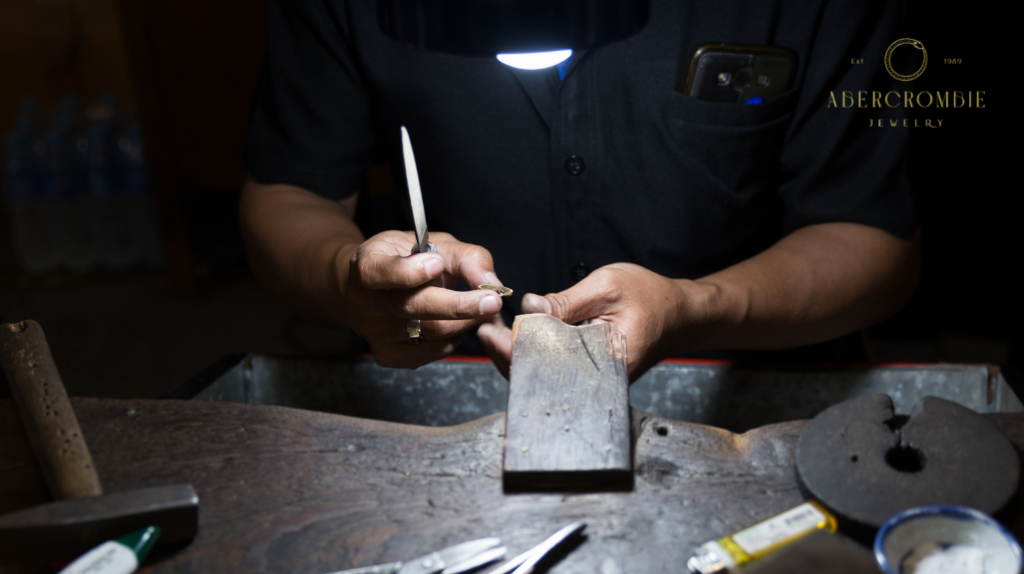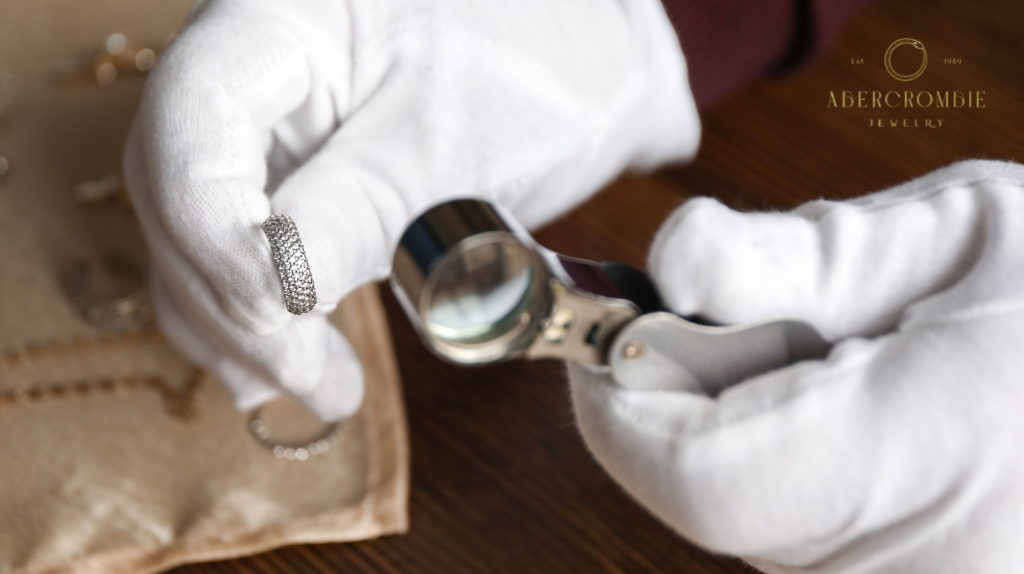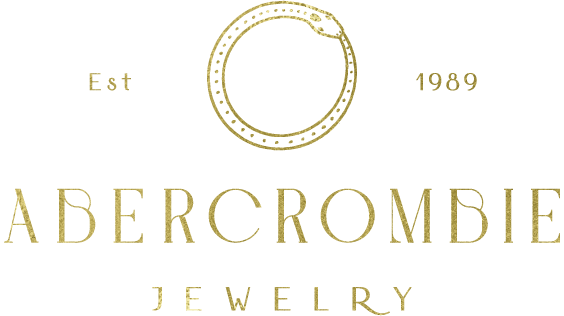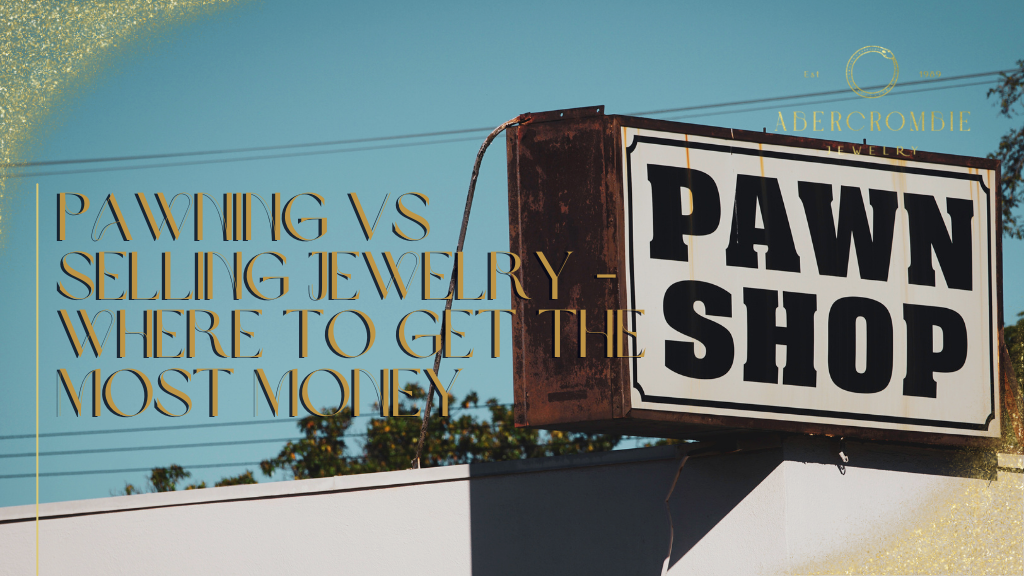Explore the differences between pawning and selling jewelry with insights from Abercrombie Jewelry. Find out where to get the most money for your valuables and make informed decisions.
When facing financial difficulties and needing cash fast, selling or pawning your jewelry are two great options.
However, there are a number of reasons to avoid pawning your jewelry, even though it might seem like the best approach at first. Ultimately, the decision depends on your unique needs and preferences. In this article, we’ll dive deeper into the ins and outs of pawning vs. selling your jewelry to help you make an informed decision.

Taking a Pawn Loan
There are two ways to get quick cash from a pawn shop. The first is by taking a pawn loan. This is often the option for those who are in a pinch and need to make money fast but don’t want to let go of their jewelry.
When you pawn your jewelry, you essentially allow the pawn shop to hold your jewelry piece as collateral until you can repay the loan. Once you pay it off, you will get your jewelry back. It’s important to note that pawning jewelry is essentially taking a loan so that interest rates will apply.
To Pawn Your Jewelry or Not to Pawn Your Jewelry?
Although pawning an item may seem like the better option, it’s important to note that certain drawbacks accompany the benefits, so it’s important to look at it holistically to ensure you make the best choice.
Pros of Pawning Your Jewelry
There’s no doubt that taking a pawn loan can be beneficial for several reasons. Let’s look at some of the most prominent advantages of choosing this option.
You Can Get Your Items Back
Pawning your jewelry is the best option if you have a piece that holds sentimental value. Instead of saying goodbye to it forever, you can have the pawn shop hold onto it until you have repaid your loan.
A Collateral Loan Can Be Approved Quickly
If you need cash quickly, you’ll be happy to know that pawn loans can be approved in just a few minutes, so you won’t have to wait for a lender to check your references. Moreover, most pawn shops pay out fast, so it’s a great option if you need money quickly.
The Same Items Can Be Used for Loans Over and Over Again
Another great reason to pawn your jewelry is that you can use the same item again once you pay back the loan. You will have the assurance that you always have collateral to obtain a loan. If you sell the item, you no longer have that backup plan.

Flexibility to Extend the Loan Period
Another reason many choose to pawn their jewelry is that most pawn shops typically allow borrowers to extend their loan term, a kind of flexibility generally not available with a bank loan. What’s great about this is that your extended loan term won’t appear on your credit history.
Cons of Pawning Your Jewelry
While these pros make pawning vs. selling a better option, there are certain drawbacks that you need to be aware of before you decide which option is best for you.
There Is a Risk of Losing Your Items
When you pawn your jewelry, you risk losing your items. You are typically offered a percentage of the market value of the jewelry piece when you pawn it, so if you do not make payment on time, you could lose it for a much smaller amount.
Payment terms are very strict with pawn loans, so failure to make timely payments could result in losing something with immense sentimental value.
You Will Pay Interest
There’s no doubt that pawnshops charge hefty interest rates for loans, so you should be prepared to pay interest.
Shorter Repayment Period
Unlike loans from banks and other financial institutions, pawn shops in the US typically give borrowers 30 days to repay the loan. This means that if you’re hoping to repay the loan over a longer term, it’s probably best to sell the item rather than pawn it.
You Aren’t Necessarily Guaranteed a Large Amount
Just because you bring in an item worth $3,000 doesn’t mean you will qualify for a loan of $3,000. You will likely receive a percentage of that amount, and it’s up to the pawnbroker to decide, so there’s much less predictability.
Selling Items at a Pawn Shop
When you sell your jewelry at a pawn shop, it is no longer yours, and you give away your rights to it. However, selling items can be beneficial for several reasons, especially if you don’t want to pay high-interest rates and get a higher amount for your jewelry.

Informative Blog: What Is Composite Diamond: The Complete Guide
The Pros of Selling Rather Than Pawning
Here are some of the main benefits that you can expect when you sell your jewelry at a pawn shop:
You Can Get More Money for Your Jewelry
As we have already seen, pawnbrokers only offer loans on a portion of the value of an item. However, when you choose to sell, you’ll get a higher cash value delivered quickly in cash or transferred into your bank account.
It’s important to note that if you choose to sell your jewelry to a pawn shop, you must conduct thorough research into a fair price to ensure you aren’t settling for less.
It’s a Great Way to Convert Unwanted Jewelry to Cash Fast
Suppose you have an old engagement ring that’s valuable but reminds you of your ex-lover. Selling it is a great way to move on and get quick cash for something you no longer need.
You’re Not Tied to a Payment Plan
There’s no need to ensure that you meet strict payment plans when you choose to sell. Plus, you won’t have to worry about losing a valuable item for less than it’s worth and schedule regular payments.
You’re Spared of the Hassle of Having to Find a Buyer
When you sell jewelry at pawn shops, you won’t have to fuss with setting up product descriptions, uploading images, and dealing with potential buyers. Simply walk in, agree on a price, and walk out with your pocket full of cash.
However, it’s important to note here that pawn stores often offer low offers because they have to resell the jewelry, so it might be best to look at local jewelry stores and explore other options if your mind is set on selling.
Cons of Selling Your Jewelry
While selling your jewelry outright does give you instant cash, there are also associated disadvantages.
You Relinquish Ownership
You cannot get your jewelry back if you sell it instead of pawning it. When you get the cash, ownership of the item is transferred to the pawn store. If you sell it and later decide that you would like to get it back, you will have to repurchase it for the broker’s asking price.
However, it’s important to remember that pawn shops are controlled at local, state, and federal levels, and there may be laws in place that prohibit pawn shops from reselling an item to the individual who originally sold it to them. This is why you must decide to sell after careful consideration.

It’s Generally Harder to Sell Than to Pawn Jewelry
When it comes to purchasing jewelry, pawnbrokers are often more demanding than when it comes to offering a collateral loan. That’s because collateral is kept in a secure area of the pawn shop until the loan has been repaid and it’s time to return the item to its owner.
If pawnbrokers purchase jewelry, they assess how much their customers will be willing to pay for it and how quickly they believe they can sell it.
If they don’t think their clients would respond favorably to your piece, you will either receive a low-value offer or none.
Selling Is Once-off
With pawn items, you can use the same items repeatedly to obtain a loan. However, when you sell them, you relinquish ownership, so you cannot use the same jewelry pieces to obtain a collateral loan.
Tips for Making the Right Choice
The truth is that there is no right or wrong option. We cannot give you a blanket response because it depends on your unique situation, needs, and preferences. However, we can provide a few tips to help you make the right choice.
Jewelry, gold jewelry, in particular, is always in high demand, so if your situation allows, we recommend selling your piece rather than pawning it. This will ensure that you get a higher price for the item and that you’re not tied to a payment plan.
However, if the item is a family heirloom, you should consider pawning it. Once you decide to sell, there’s often no going back, so it’s important to only sell to a pawn shop if you’re confident this is the right choice.
Here are a few questions that you should ask yourself before you pawn or sell jewelry:
- Does this item hold sentimental value?
- Is it something that is in demand or would sell well?
- Can you afford to meet the terms of a short-term loan?
- Are you okay with parting with the item?
If you have an unwanted piece of jewelry you are willing to part with; we recommend selling it to make the most from it and free yourself of the stress of having to repay a larger sum later. In comparison, if you need quick cash and have an item with sentimental value, you may be able to receive a short-term collateral loan by pawning it so that you can get it back.
The Final Verdict – Should You Sell or Pawn Your Jewelry?
Pawning and selling jewelry are great ways to get cash in a pinch. However, understanding the pros and cons of each option is essential if you want to ensure that you’re making the best move.
While pawning an item might seem the best option, we highly recommend selling it. The risk of losing something sentimental value is too great with a pawn loan. Besides, selling gives you a higher price for your jewelry.
While selling is undoubtedly the better option, a pawn shop may not be the best option if you want to get the best price. Most pawn stores offer low amounts for jewelry because they have to resell the items, so it’s probably best to shop around before selling.
At Abercrombie Jewelry, we buy various metals and gemstones, so be sure to schedule an appointment with us if you’re hoping to fetch a good price for your unwanted items.
Frequently Asked Questions
Want to know more? The section below answers some of the most asked questions about this topic.

